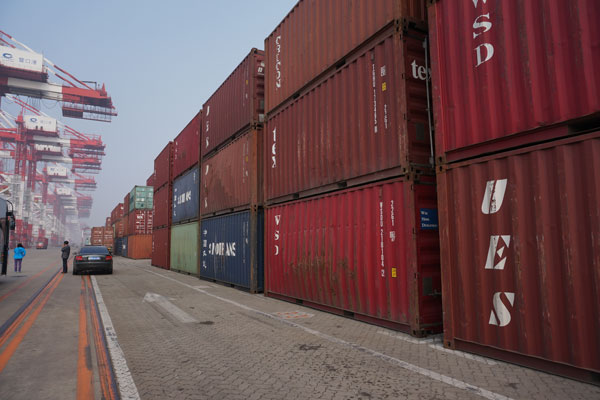 |
|
Containers at the Yingkou port in Yingkou city, Northeast China's Liaoning province on Oct 19, 2016. [Photo by Yao Yao/ chinadaily.com.cn] |
Yingkou port in Northeast China's Liaoning province has recorded a surge in exports after the launch of the Belt and Road Initiative. ranking eighth of all the sea ports in the country in terms of port handling capacity.
"In the past, domestic trade took up more than 90 percent of the port's business. However, in recent years there has been an increase in exports to Japan, South Korea, Mongolia, and Moscow as a result of the Belt and Road Initiative," said An Dabo, who is responsible for the Party committee work at the port management company.
The geographic advantage of the Yingkou port puts it in an advantageous position.
The port, the only one on the Silk Road Economic Belt and also the 21st-Century Maritime Silk Road- constituting the Belt and Road Initiative, is the nearest port to Russia.
Besides, it boasts the largest port business by linking Russia's Trans-Siberian Railway through Manzhouli in North China's Inner Mongolia autonomous region.
When the Belt and Road Initiative was launched in 2013, the port sought to cooperate with Russian Railways by signing a memorandum of understanding to strengthen mutual trade.
"The Russian Railways chose to cooperate with us, because they think highly of our business volume," said Li Guodong, head of the International Cooperation Department in the port management company.
In 2015, the number of goods transported through the Yingkou-Manzhouli-Europe rail link accounted for 50 percent of the export quantity of Manzhouli border port, ranking the first in the country.
As part of Belt and Road efforts, the port now has railway routes to cities such as Moscow, Russia, and Warsaw, Poland.
Meanwhile, the Yingkou port also sought to enhance cooperation with Taicang Port in East China's Jiangsu province in a bid to expand its trade business to the Yangtze River Economic Belt, said Li.
Through this southward expansion, Yingkou port aims to link and cooperate with the Northeast Asia and ASEAN countries, which further forms a sea shipping channel.
Li said the port will see trade volume, including exports, increase since the port was listed as one of the 10 hub ports on the Belt and Road Initiative.
The Belt and Road Initiative - the Silk Road Economic Belt and 21st-Century Maritime Silk Road Initiative - brings together countries in Asia, Europe and even Africa via overland and maritime networks.
